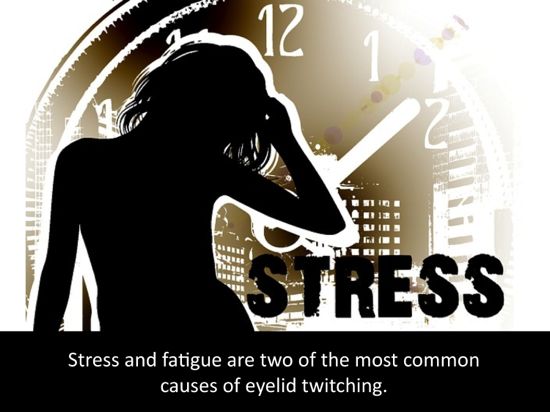Eye Tic Syndrome (Computer Vision Syndrome)
"It's kind of like all the things your mom lectured you about growing up: lack of sleep, staring at screens, dry eyes, caffeine, dehydration, stress."
"[If a twitch happens], something has misfired, involuntarily."
Shameema Sikder, ophthalmologist, Johns Hopkins University School of Medicine
"[Eye twitches, or chronic myokymia, represents] fine, continuous, undulating contractions [across the orbicularis oculi muscle]."
"It's annoying [but], if patients can tolerate it, it's best that they just wait it out, and it will go away."
Rudrani Banik, ophthalmologist, Mount Sinai School of Medicine

Got a twitching eye? It's annoying. It's one of those things you wonder about; you feel it you know it's there but does anyone looking at you see it? Should you mention it? Are they too polite to remark on it? Evidently doctors assure their patients that though they are themselves acutely aware that their eye is continually, delicately but definitely twitching, no one else would be aware of it, even if they happen to be looking directly at you. Perhaps it would take sustained, close observation and people don't usually engage in that kind of intrusive viewing of other peoples' faces.
For relief from that twitchy eye that keeps spasming and annoying you, take a break from that computer screen after 20 minutes have elapsed, and do it regularly. Close your eyes and relax before resuming that stare at the glare. Closing your eyes can help to hydrate your eyes. Dr. Sikder mentions that Botox which disrupts communication between nerves and muscles has a high success rate in stopping a really persistent twitch. So if matters become really, really serious with that disruptive twitch, opt for a Botox injection.
Or not. If the frequency, duration and pattern of the twitch changes notably for the worse, it's time to consult your doctor. Should other facial muscles also begin twitching, or pain result in association with the twitch, it should be medically monitored; that combination of associated symptoms could conceivably be signals of damaged nerve fibres -- or, worse-case scenario, a brain-stem disease. Heaven forfend, tuck that away somewhere deep and out of sight.
As we spend more time continually viewing screens, we have a tendency to forget our health goals in prevention of complications due to excessive lifestyle habits. Our eye muscles become fatigued when we favour remaining fixated on that screen rather than tucking ourselves into bed at a decent hour. Although why the biological reaction to close and continuous screen bonding causing that benign eye twitch is unknown, the process is understood, that the delicate muscle fibres which open and close the eyelid are impacted.
/arc-anglerfish-tgam-prod-tgam.s3.amazonaws.com/public/PWWKGIV2ARAOVCX76223ZAPN7I) |
| iStock |
Dr. Banik with Mount Sinai School of Medicine studied the incidence of benign eyelid twitch, following patients over a multiple-year period. It might surprise, but seven years is evidently the average length of time reported with an eye twitch; that's pretty chronic and would certainly tend to wear people down, much less impact on their screen-viewing habits, whether an iPhone or a computer screen.
None of the patients that Dr. Banik studied progressed to a neurological condition throughout the period of the study but it is known that in rare cases an eye twitch can act as a symptom of a larger issue. Remedy? Relax an eye twitch by ensuring you have enough sleep hours, take in less caffeine, don't overindulge in alcohol, and of optimum importance, take those screen breaks.


0 Comments:
Post a Comment
<< Home